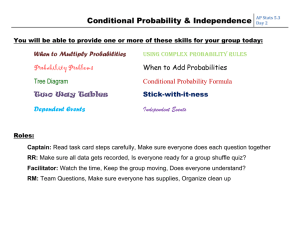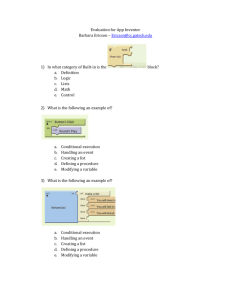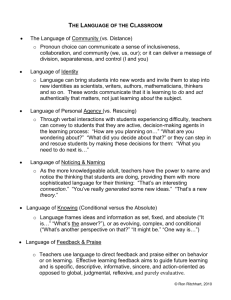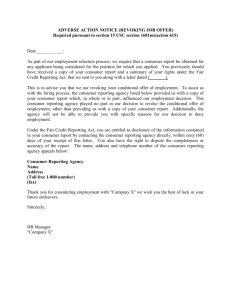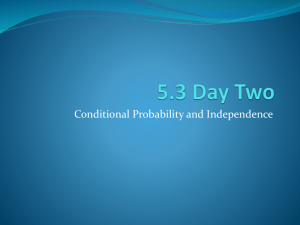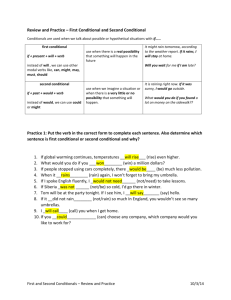Lecture 6 Slides
advertisement
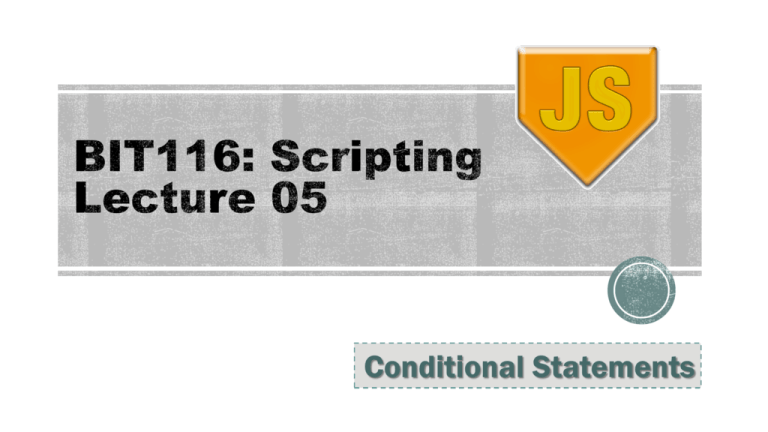
Conditional Statements
Quiz
Hand in your jQuery exercises from last lecture
They don't have to be 100% perfect to get full credit
They do have to be "done except for maybe some small-ish errors"
JavaScript: Conditional Statements
2
Conditional Statements – Basic Syntax
3
What is a Conditional Statement?
A conditional statement is a statement that you can use to execute a bit of code based on a condition or to do
something else if that condition is not met. You can think of a conditional statement as being a little like cause
and effect.
Here's an example:
"If a variable named myMoney is greater than 1000, send an alert that says my
finances are OK. Otherwise, send an alert saying I need more money!"
4
The if , if/else , if/else if/else Statements
if statement: use this statement to execute some code once only if a specified condition is true
if...else statement: use this statement to execute some code if the condition is true and another code if the
condition is false
if...else if....else statement: use this statement to select one of many blocks of code to be executed
5
The if Statement (Example)
if (hour < 18)
{
show = "Good day";
}
FILE: Conditional_Demonstration_1.html
6
The if…else Statement (Example)
if (hour < 18)
{
show = "Good day";
}
else
{
show = "Good evening";
}
FILE: Conditional_Demonstration_1.html
7
The if…else if…else Statement (Example)
if (hour < 12)
{
show = "Good morning";
}
else if ( hour < 18 )
{
show = "Good afternoon";
}
else if ( hour < 22 )
{
show = "Good evening";
}
else
{
show = "Goodnight!";
}
if (hour < 12)
{
show = "Good morning";
}
else
if ( hour < 18 )
{
show = "Good afternoon";
}
else
if ( hour < 22 )
{
show = "Good evening";
}
else
{
show = "Goodnight!";
}
FILE: Conditional_Demonstration_1.html
8
9
The objective is to remind yourself what to type in order to get an if, if/else, or
multiway if…else to work
Conditional Statements – Effective Usage
10
Think of an if as a way of asking if the program should
optionally do something extra, then resume the program
var hour = $("#time");
// Store time into variable
var hour = $("#time");
if (hour < 18)
{
$("#optionalOutput").html(
}
$("#requiredOutput").html("Your
"Good day!");
time is " + hour);
// Is it before 6pm?
if (hour < 18)
NO
YES
// OPTIONALLY tell them 'good day'
$("#optionalOutput").html("Good day!");
// ALWAYS tell the user what their choice is:
$("#requiredOutput").html("Your time is " + hour);
11
If/Else: Either do A or else do B
One and only one will happen!
var hour = $("#time");
if
{
(hour < 18)
// Store time into variable
var hour = $("#time");
NO
// Is it before 6pm?
if (hour < 18)
YES
$("#additionalOutput").html("Good day!");
}
// THEN tell them 'good day'
$("#additionalOutput").html("Good day!");
else
{
$("#additionalOutput").html("Good evening!");
}
// OTHERWISE Tell them 'good evening'
$("#additionalOutput").html("Good evening!");
$("#requiredOutput").
html("Your time is " + hour);
// ALWAYS tell the user what their choice is:
$("#requiredOutput").html("Your time is " + hour);
12
Think of an if as a way of asking if the program should
exactly one of a several possible choices
// What is the
hour?
if (hour < 12) {
hour< 12
show = "Good morning";
} else if ( hour < 18 ) {
show = "Good afternoon"; 12 ≤ h< 18
} else if ( hour < 22 ) {
show = "Good evening";
} else {
18 ≤ h< 22
show = "Goodnight!";
}
hour≥ 22
// Tell them 'good morning'
Show = "Good morning";
// Tell them 'good day'
show = "Good day!";
// Tell them 'good evening'
show = "Good evening!";
// Tell them 'goodnight'
show = "Good night!";
$("#requiredOutput").html("Your time is " + hour);
// ALWAYS tell the user what their choice is:
$("#requiredOutput").html("Your time is " + hour);
13
1. List the steps that must be done in order to solve the problem
2. Identify those steps that are
OPTIONAL, EITHER-OR, or CHOOSE ONE (FROM MANY)
These will be your if, if…else, and multiway if…else's
3. Sketch out you’re your solution
You can use flowcharts, like we did on the prior slides
You can use pseudocode, which is easier to write into comments in your source code
file
4. Proofread your solution!!!
5. Code it up
6. Test it out
1.
Figure out the answer yourself, by hand, then compare to the program
14
Problem specification:
Create a page that will convert from
Fahrenheit to Celsius. In addition, if the
temperature is below freezing you should
display a message formatted to look
'chilly'. Similarly, display a 'toasty' looking
message if the temperature is above
boiling.
15
I'll assume that you can set up the HTML and basic jQuery stuff on your own. We're just
focus on the problem-specific stuff
List steps:
First, get input
2. Next, run through formula
1.
NOTE: You will probably need to look this up. Looking it up is something you need to do,
not something that the program does.
Display results on page
4. Tell'em if it's freezing
5. Tell'em if it's boiling
3.
Try writing this in a flowchart format
Try writing this in pseudocode format
(I'll do this in OneNote, so check the after-class videos to see these demonstrated
16
Once you've thought the problem through (listing, flowchart/pseudocode), then code it
up!
Test
Remember: Calculate the answer yourself, then compare it to your program
Try several temperatures between freezing & boiling
If you don't remember it off-hand then look up for yourself what these are in Fahrenheit
Try freezing exactly, then one degree above and one degree below
Does the 'chilly' message show up correctly?
Try boiling exactly, then one degree above and one degree below
Does the 'toasty' message show up correctly?
Are there any other problems with this?
FILE: F2C.html
17
If we put in 300 & click we get the 'hot' message.
If we then change it to 3 & click we see BOTH messages
We'll fix this with an if…else
FILE: F2C_IfElse.html
18
19
Problem specification:
Create a page that convert a 0100 numeric grade into an 'A',
'B', 'C', 'D', or 'F' grade, based on
the table to the right.
If a number greater than 100 or
less than zero is used then
display an error message on the
page.
Numeric Grade Letter Grade
>100
Error!
90 – 100
A
80 – 90
B
70 – 80
C
60 – 70
D
0 – 60
F
<0
Error!
20
List steps:
1. First, get input
2. If the grade is negative, display an error and immediately exit/stop/halt/etc.
3. If the grade is >100, display an error and immediately stop.
(If we make it past this step then the input must be ok)
(mostly – we're assuming that it's a number )
4. Use a multiway if/else to figure out which letter grade they're getting
Let's try writing this in a flowchart format
Useful idea:
'Peeling off' errors
'Peeling away' cases
Let's try writing this in pseudocode format
(I'll do this in OneNote, so check the after-class videos to see these demonstrated)
21
Once you've thought the problem through (listing, flowchart/pseudocode), then code it
up!
Test
Remember: Calculate the answer yourself, then compare it to your program
Try it with 95, 90, 100
Try it with 85, 80, 90
Etc, etc
Try it with 101, 110, 200
Try it with 0, -1, -10
Are there any other problems with this?
FILE: GradeFeedback.html
22
A research paper that I read said that it's good to give new programmers a wider choice of exercises
So instead of "do #1, then #2, then #3"…
Instead tell people "Here's 6, pick 3"
This isn't always appropriate…
"Let's make sure you can type in the syntax"
Mechanical things like "ID different regions as CSS/JS"
… and I'm not 100% confident I can brainstorm a zillion exercises for each class, but I'm gonna try it
What ideas/interests do you have that might make for interesting
problems involving if or if/else statements?
I don't guarantee I'll use them, but it'll help
Think about this during class, and we'll brainstorm a list towards the end
(or else at the start of next class)
23
24

